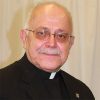Maryknoll priest reflects on mourning for loved ones who have passed away in this time of coronavirus pandemic
The specter of my mom’s inevitable death haunted my thoughts from the time I was 4 years old and saw our pet canary die. My mom consoled me with the simple truth that all living things must die but promised that God would not take her as long as I needed her.
She would live another 50 years, dying when she was a robust 94. When her time came, she left us quickly, without suffering. My sister, Jan, warned me Mom was deteriorating rapidly. I got there in time to say goodbye.
The day she died I recall a deep peace overcame me. It was like Mom was closer than ever. After her funeral Mass, we gathered for her signature recipe: “pasta fazool.” It was a worthy send-off for this strong Calabrese woman.
In recent days I have come to appreciate just how truly blessed we were to be able to say goodbye and mourn her in this way.
I am writing this reflection in the middle of the coronavirus lockdown. I can only pray it’s lifted by the time this issue of the magazine appears.
Besides the minor inconveniences of being restricted to our rooms except to leave the building for a walk outside (and only if we wear masks and latex gloves), there exists a greater, unseen sorrow: people are losing loved ones but cannot bid them farewell in person; no last rites, no wake, no funeral, no shared meal.
During quarantine, we’ve lost several priests and brothers at Maryknoll. Confined to their rooms on the isolation floor of the nursing home wing of our center, they simply died and disappeared. We held memorial Masses attended by just a celebrant and reader, viewed only on private television sets on our in-house TV channel in individual rooms.
Thus, like the rest of the world, we can grieve in private but cannot fully mourn as a community. Public mourning gives expression to personal grief. Only ritually expressed grief opens the heart and spirit to healing.
Surely, the longest and saddest journey a missioner makes is the return home to bury a deceased parent. But the loss becomes even more painful when circumstances prevent the missioner from being there at all.
Father Dennis Moorman, a Maryknoll missioner in Brazil, received word on April 14 that his mother, Martha Ann Moorman, had passed away in a nursing home in Greensburg, Ind. Travel restrictions during the pandemic made it impossible for him to return home.
Father Moorman, whose ministry is treating people suffering from trauma, appreciated what his siblings were going through. “It was traumatic for them to be so close but unable to be with Mom in her last days,” he said. “And we can’t grieve in the usual way: together.”
From Brazil he offered a live-streamed Mass to a limited number of online participants.
Like countless others all around the world, they had been deprived of the right to mourn in the traditional way: in person and in public, using the prayers and rituals of their faith.
Respectfully burying the dead and honoring their memory is the hallmark of human civilization. To be denied this fundamental human need makes an already sad event all the more tragic.
When this pandemic ends and we discover our new “normal” way of life, may we all appreciate the privilege of being once again able to mourn our dead with prayers and rituals, with family and friends gathered around us, as the true blessing it is. And in our blessed mourning may we sense the dawn of resurrection.
Featured Image: When Vera Veneroso (left) died, her family was able to say goodbye and have a funeral Mass for her, but when Martha Ann Moorman (right) died, the COVID-19 pandemic deprived her family of those rights. (Photos courtesy of Joseph Veneroso and Dennis Moorman)

